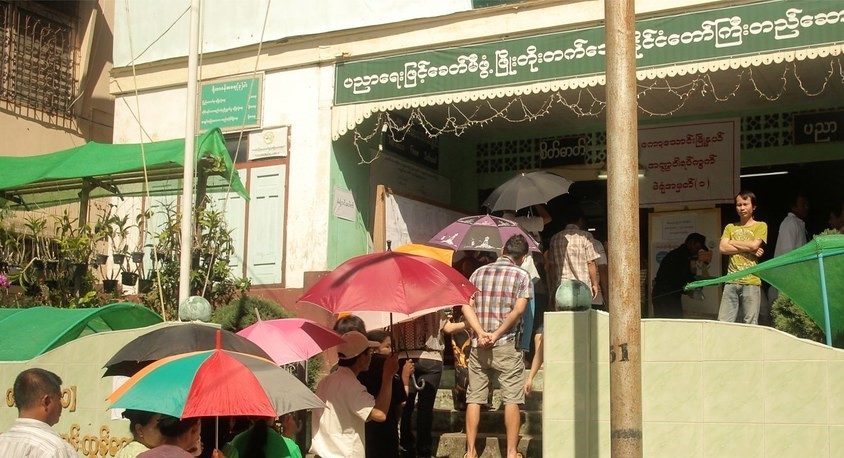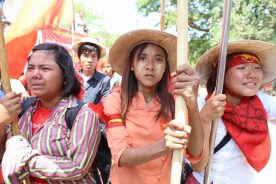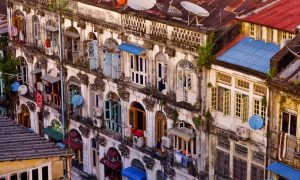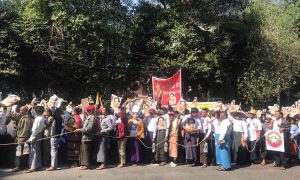In the lead-up to Myanmar’s 8 November general elections, opposition political parties have questioned the independence of Myanmar’s election management body, the Union Election Commission (UEC). The president appoints the UEC, which has the same five-year tenure as the president (and parliament). All major parties have accused the UEC of lacking independence from the serving government. When the NLD was in opposition, it criticised the partisanship of the UEC, and the USDP has previously declared it has “no confidence” in UEC staff. However, recently opposition parties have raised the stakes. In August, the USDP led a delegation of dozens of parties to a meeting with Tatmadaw chief Senior General Min Aung Hlaing to petition the Tatmadaw to intervene if the UEC decides to “corrupt” the elections.
The UEC was established in 2010, to oversee the restoration of elections. There have been three terms of government since 2010, and hence three major changeovers of staff in the UEC. The UEC held the 2010 elections with procedural limitations that led the United Nations human rights envoy for Myanmar at the time to call the polls neither free nor fair. The main opposition parties, the NLD and most ethnic parties, boycotted the elections, and election observers were not permitted.
Although a couple of local organisations did observe the vote, the quality and coverage of observation were inadequate, and their analysis was not widely publicised within Myanmar. Individuals and groups that engaged in citizen observation of the elections were closely surveilled by the Special Branch of the Myanmar Police Force (part of the Ministry of Home Affairs) and foreign nationals among them were deported.
By contrast, successful election observation contributed to the perception that Myanmar’s 2015 elections were mostly unaffected by significant irregularities, but conditions in 2020 will pose major challenges to election observation.
In the lead-up to the 2015 elections, the USDP-appointed commission increased the engagement of local and international electoral observation organisations. This resulted in the formalising of a role for election observers in the UEC’s Code of Conduct and Accreditation procedures. The UEC issued accreditations to 470 diplomats from thirty-two international embassies, 465 staff from six international election observation bodies, 183 staff from nine international organisations assisting in electoral processes, and 9406 monitors from Myanmar CSOs with election monitoring program. Observers monitored thirteen stages of the electoral process; from observing electoral laws, bylaws, regulations, orders and instructions to election dispute resolution.
During the NLD’s current term, the UEC has made some controversial administrative changes, including the replacement of experienced staff from the previous commissions. The UEC also ended the practice of hosting polling places inside Tatmadaw compounds for military personnel and family members, a move opposed by both the USDP and Tatmadaw. This practice was assumed to compromise the independence of votes cast by Tatmadaw personnel and families. Reporters have suggested Tatmadaw personnel and families voted overwhelmingly for the USDP in 2015, with election observers reporting they were mostly unable to monitor polling places on military installations.
The UEC seems to have gradually become more sceptical of civil society election observers. When the UEC released its code of conduct for election observers in July, it had changed its term for election observers from a portmanteau verb made up of the verbs for “to monitor” and “to study” (ရွေးကောက်ပွဲ စောင့်ကြည့်လေ့လာသူ). The new term removed the verb for “to monitor,” implying a more passive role for election observers. This attitude is also reflected in the UEC’s statement at a recent stakeholder meeting that civil society organisations participating in elections in the spirit of “family” would be welcome, implying that organisations criticising the commission would not be well-received. The UEC has also revoked the rights of observers to observe the legal process (electoral laws, bylaws, regulations, orders and instructions), printing of ballot papers, UEC decision-making processes and evaluation of complaints.
The difficulty experienced by the civil society election observation organisation People’s Alliance for Credible Elections (PACE) as an association is another example of the UEC’s increased scepticism towards civil society. The UEC initially disaccredited PACE as an election observer, arguing that it is not a registered association (a disingenuous move given PACE is not able to secure registration without the UEC’s recommendation). The UEC’s refusal to endorse PACE’s registration was due to violations of the Association Law, as PACE has accepted foreign donations without a registration. But PACE has at times been highly critical of the UEC, and the obstruction their registration may have more to do with the UEC signalling that organisation critical of the UEC would be shut out. After a joint statement was issued by 450 CSOs, the UEC relented and accredited PACE as an election observation group.
As of September 18th, the UEC had issued national-level accreditations for over 8000 observers from ten Myanmar CSOs with election monitoring programs. There is also a state/region level application process, with far more CSOs accredited. The UEC has also accredited two international civil society organisations to send observers: the Carter Center, and the Bangkok-based Asian Network for Free Elections (ANFREL) organisation.
The Covid-19 pandemic has disrupted election observation organisations’ plans. Flight restrictions out of many countries and into Myanmar have made it difficult to organise travel. In a departure from its regular procedures, the Carter Center has staffed half of its 2020 election observer mission with Myanmar nationals. The pandemic also threatens to incapacitate election observer teams. The infection of a single member will require the remainder of the observer team to self-isolate to avoid spreading the infection. ANFREL’s staffing plans have already been disrupted by the self-isolation of an entire observer training course after their driver tested positive for COVID.
Travel restrictions and quarantine requirements are already impacting the domestic observation. There was no reporting on certain stages of the electoral process, including the display of voter lists and pre-electoral assessment. The electoral assistance groups were able to operate relatively freely in 2015 with the UEC’s approval. Now, they will be required to secure approval from the General Administration Department in the relevant townships, which will dramatically limit their freedom of movement. Training of observers cannot be conducted in person or effectively.
The UEC has not yet laid out clear guidelines for the mobility of observers on election day. This is partly because the UEC initially anticipated restrictions would only be necessary in areas with consistently high positive cases: at the time, Yangon and border areas. Nevertheless, physical distancing requirements imposed by the UEC may oblige observers to physically distance themselves from the polling process, hampering the effectiveness of observation.
A recent outbreak of Covid-19 in Rakhine state seems to have spread to Yangon and other major cities, apparently coinciding with an escalation in spread from existing cases. As of September 25th, Myanmar’s second wave of Covid-19 has produced over 8,344 positive cases, with over 150 of these proving fatal. An average rate of 150 new cases per day has led the government to impose lockdowns in all of Yangon’s townships, as well as in many other towns and cities. Less than two months away from the elections, the UEC recently admitted that it could not deliver training to sub-commissions physically and was attempting to shift to virtual delivery.
The survival of Myanmar’s democracy demands institutional forbearance
Persistent adherence to the written rules makes Mynamar's vulnerable to authoritarian tendencies and threatens a fragile democracy.
On 15 September the USDP and twenty-three other parties signed an open letter petitioning the UEC to reconsider the election date. The pandemic has delayed many smaller parties’ preparations for the elections, leaving them feeling disadvantaged relative to the NLD. Despite these mounting difficulties, the UEC has resisted repeated calls to postpone the elections, and as recently as the 19th of September, affirmed the elections would go ahead as planned in November. The UEC is authorised to postpone elections in the case of a natural disaster; however, the 2008 Constitution requires a new parliament to be ready to sit when the term of the old parliament expires after five years (on the 31 January, 2020).
There is no consensus among political parties on how to overcome constitutional crisis if elections are postponed beyond the current parliamentary term. The USDP has claimed a State of Emergency would be required in the event of a long postponement, which could lead to the temporary control of the Myanmar executive by the National Defense and Security Council, where the military occupies a majority of seats. After decades spent struggling to remove the Tatmadaw from executive power, the NLD is very reluctant to embrace this option.
The role of the UEC seems increasingly politicised, both for opposition political parties and civil society organisations. Opposition parties seem increasingly willing to play a dangerous game of escalation in their criticism of the UEC. Remembering the Tatmadaw’s long history occupying the Myanmar executive on the pretext that elected governments were too corrupt and ineffectual to be trusted to govern the country, the meeting in August between Min Aung Hlaing and opposition parties implies the threat of military intervention. But the UEC has also left itself open to some of these criticisms by failing to conduct itself in a manner that puts it beyond the reproach of partisanship. The debate over the role of the UEC and observers is not necessarily unhealthy. It could yet be an opportunity for civil society election observers to push for democratic, transparent electoral reforms including measures to reduce the apparent-partisanship of the UEC, and the legislation of election observation. It is also an opportunity to reform the regulation and management of elections to put in place contingency plans so that future natural or epidemiological disasters will not put the health of Myanmar’s democracy at risk.
This report is based on publicly reported material as well as personal conversations with representatives of ANFREL and Carter Center.
 Facebook
Facebook  Twitter
Twitter  Soundcloud
Soundcloud  Youtube
Youtube  Rss
Rss 



